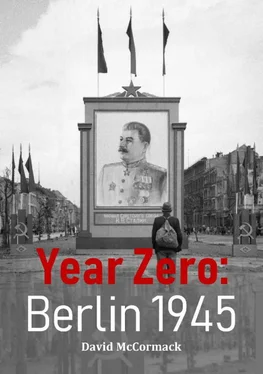Himmler, however agreed to some of my other requests. He agreed that if Denmark should become a battle-ground, the Scandinavian prisoners of war were to be transported to Sweden through the help of the Swedish Red Cross. He also showed genuine interest in my proposal that the Swedish Red Cross be allowed to fetch all French women interned at Ravensbruck concentration camp, and said that he not only agreed to this, but that he wished us to remove women of all nationalities from there, as the camp in question was shortly to be evacuated. I promised him that I would immediately give our detachments orders to this effect.
A few hours earlier in his meeting with Masur, Himmler had limited the number of prisoner releases at Ravensbruck to 1000, now after this remarkable volte-face, he retired to his bed, utterly exhausted.
Himmler slept fitfully. A few hours later, he complained of feeling ill to Schellenberg. His right hand man could only state in exasperation, ‘There’s nothing more I can do for you’. Later, after discussing the deteriorating military situation, Schellenberg accompanied Himmler to their headquarters located near Wustrow. After being delayed by marauding enemy aircraft, Himmler said, ‘Schellenberg, I dread what is to come’. That evening, they discussed the war situation again, Schellenberg was highly critical of policy regarding the remaining concentration camp prisoners:
After dinner, when we were alone again, we spoke of various problems of food supplies, the danger of epidemics, reconstruction, prisoner-of-war administration, and so on, I told him of Kaltenbrunner’s blind and unrealistic attitude in insisting on the evacuation of all the concentration camps…
Schellenberg went on to say that he considered the evacuation of the camps to be a crime. He argued that it would be better to leave the prisoners in situ, where in due course they would be relieved by the advancing Allies. Himmler retorted, ‘Schellenberg, don’t you start too! Hitler has been raging for days because Buchenwald and Bergen-Belsen were not completely evacuated’. Notwithstanding, Himmler’s vacillations, he had in effect finally crossed the Rubicon. His contacts with Masur and Bernadotte initiating a process which within a matter of days would lead to a complete break with Hitler.
Chapter Eight
‘Are the Russians already so near?’
The civilian population of Berlin had long since become accustomed to Allied bombing raids. They were frequent, noisy and violent, yet they had a certain predictability. However, following the last Allied raid on Berlin, carried out by American bombers on the morning of 21 April, that sense of predictability vanished. The first Soviet artillery strike delivered on the heart of Berlin shortly after the last American B-17 departed was an altogether different experience. That morning, the streets were busier than usual as civilians rushed to secure what would probably be their last supplies before the siege began. There were particularly heavy queues outside the boarded up, but still very much in business, Karstadt department store on Hermannplatz. Many others took the opportunity after the expected lull following the air raid, to fill whatever containers they had with water from pumps or standpipes.
When it came, the sound of artillery fire momentarily transfixed shoppers who realised too late that the incoming deluge of hot metal was heading straight for them. Seconds later, shells began to plough up the area. Unprotected bodies were hurled into the air, or smashed against the boarded up sides of the department store. The scene was one of utter carnage. Those who could, fled in panic. The dreaded Ivan was at the gates.
Hitler’s realisation that Berlin was now a front line city came shortly afterwards as the intensity of the Soviet barrage increased. By now, shells were landing everywhere across the city. Even Hitler’s bunker was not totally immune as vibrations rocked the structure. Being an old infantryman, Hitler was quickly able to discern that this latest attack was shellfire and not aerial bombs. He emerged from his room unshaven, demanding to know from General Burgdorf what exactly was going on. Burgdorf answered that Berlin was under fire from Soviet artillery. Hitler could not quite bring himself to accept the reality of the situation asking, ‘Are the Russians already so near?’. The suggestion that the gunfire was directed from long range batteries on the Oder prompted Hitler to telephone the Luftwaffe Chief of Staff for clarification. General Karl Koller was at his headquarters in the Werder Game Park when the call came through:
Hitler: Do you know that Berlin is under artillery fire?
Koller: No.
Hitler: Can’t you hear it?
Koller: No, I am in the Werder Game Park.
Hitler: There is great agitation in the city over this long-range artillery fire. They tell me the Russians have brought up heavy guns on railway trucks. They are supposed to have built a railway bridge over the Oder. The Luftwaffe must attack and eliminate these bridges at once.
Koller: The enemy has no railway bridges over the Oder. He may have captured a German heavy battery and turned it around. But he is probably using his own medium guns – he is close enough to hit the city with them.
Despite his conversation with Koller, Hitler still could not concede that the Red Army was within effective striking range of the city. Angrily, he threatened Koller and the Luftwaffe staff with execution. His anger was perhaps a sign of his recognition that he could no longer influence events, but merely react to them. His mood improved somewhat later in the day, perhaps as a result of Dr Morrell’s drugs, perhaps as a result of his self delusion that the so-called ‘Army Detachment Steiner’ could blunt Zhukov’s advance. For ordinary citizens of Berlin, all this would have meant nothing as their thoughts were fixed on survival.
The bombing of Berlin had been carried out by young men from Britain and the Commonwealth Nations, Americans and men whose countries had been occupied. They had delivered their ordnance from the anonymity of the skies, never actually seeing the enemy. The bombing was impersonal, distant and almost abstract. The shelling however was carried out by a vengeful enemy who would soon be rampaging through the capital. Many people knew of the terrible atrocities that had taken place in Russia. Now they feared that the barbarity that had for so long been practised in their name would rebound on them.
On 21 April, Goebbels summoned his aides and associates to a meeting held in the private projection room of his Berlin residence. He arrived late, unshaven and anxious. After issuing the instructions for the day, he launched into a vicious denunciation of the German people:
What can you do with a people whose men don’t even fight when their women are raped! All the plans, all the ideas of National Socialism are too high, too noble for such a people… They deserve the fate that will now descend on them. And you – why have you worked with me? Now you’ll have your little throats cut! But when we step down, let the whole earth tremble.
The following day, Goebbels acting as Reichs Commissar for the defence of Berlin spoke to a group of civil servants, reminding them of their oaths and threatening dire consequences for all those contemplating surrender. He let them know in no uncertain terms that he would end his life in Berlin and that he expected them to do the same by stating that, ‘My family is now at home. We are staying here. And I demand of you, gentlemen, that you too remain at your posts. If necessary, we shall know how to die here’.
Goebbels’ determination to fight to the last in Berlin was echoed in his last published article which also appeared on the same day in the weekly newspaper Das Reich. The article ‘Resistance at any price’ was a rallying cry to the defenders of Berlin:
Читать дальше












